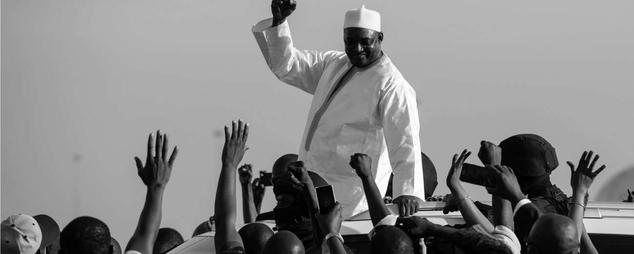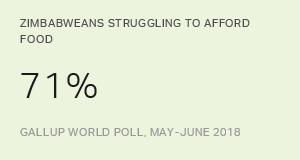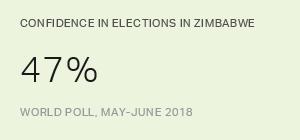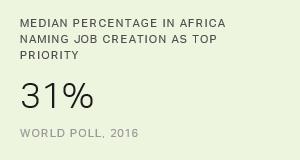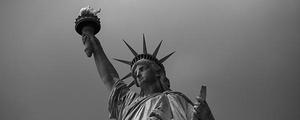Story Highlights
- Majorities of Gambians struggling to afford the basics
- Most in The Gambia have faith in president, election process
- Gambians largely expect living standards to get better
WASHINGTON, D.C. -- One year into Adama Barrow's presidency, nearly three in four residents of The Gambia approve of his leadership (72%) and are confident in the honesty of the election process (75%) that ended 22 years of authoritarian rule under strongman Yahya Jammeh. But other results from Gallup's first survey of the long-repressed country suggest Barrow cannot take these initial findings for granted.
| Gambian adults | |||||||||||||||||||||||||||||||||||||||||||||||||||||||||||||||||||||||||||||||||||||||||||||||||||
|---|---|---|---|---|---|---|---|---|---|---|---|---|---|---|---|---|---|---|---|---|---|---|---|---|---|---|---|---|---|---|---|---|---|---|---|---|---|---|---|---|---|---|---|---|---|---|---|---|---|---|---|---|---|---|---|---|---|---|---|---|---|---|---|---|---|---|---|---|---|---|---|---|---|---|---|---|---|---|---|---|---|---|---|---|---|---|---|---|---|---|---|---|---|---|---|---|---|---|---|
| % | |||||||||||||||||||||||||||||||||||||||||||||||||||||||||||||||||||||||||||||||||||||||||||||||||||
| Approve of President Adama Barrow's job performance | 72 | ||||||||||||||||||||||||||||||||||||||||||||||||||||||||||||||||||||||||||||||||||||||||||||||||||
| Confident in honesty of elections | 75 | ||||||||||||||||||||||||||||||||||||||||||||||||||||||||||||||||||||||||||||||||||||||||||||||||||
| Gallup World Poll, 2017 | |||||||||||||||||||||||||||||||||||||||||||||||||||||||||||||||||||||||||||||||||||||||||||||||||||
Barrow's election in December 2016 surprised the world -- and Jammeh, who agreed to step down only after negotiations and threats of military intervention. In his inaugural address, Barrow noted that his election was the first time since The Gambia's independence that Gambians have "changed the government through the ballot box."
In February 2017, Barrow tempered his optimism over the free election, acknowledging that his administration "inherited an economy in decline." Whether comparing The Gambia to its only neighbor or to members of the Economic Community of West African States (ECOWAS), The Gambia's per capita GDP is extremely weak. At less than $500 per capita GDP, The Gambia ranks higher than only Liberia and Niger among all ECOWAS members. The Gambia's 2017 per capita GDP was less than half that of its neighbor, Senegal, which surrounds the country on three sides.
In this climate, a majority of Gambians are struggling to get by. More than six in 10 Gambians (62%) said in 2017 that there had been times in the past year when they could not afford food -- 11 percentage points higher than residents of Senegal (51%). A majority of Gambians (54%) said there had been times in the past year when they could not afford shelter, also sharply higher than Senegal's 41%.
| The Gambia | Senegal | ||||||||||||||||||||||||||||||||||||||||||||||||||||||||||||||||||||||||||||||||||||||||||||||||||
|---|---|---|---|---|---|---|---|---|---|---|---|---|---|---|---|---|---|---|---|---|---|---|---|---|---|---|---|---|---|---|---|---|---|---|---|---|---|---|---|---|---|---|---|---|---|---|---|---|---|---|---|---|---|---|---|---|---|---|---|---|---|---|---|---|---|---|---|---|---|---|---|---|---|---|---|---|---|---|---|---|---|---|---|---|---|---|---|---|---|---|---|---|---|---|---|---|---|---|---|
| % | % | ||||||||||||||||||||||||||||||||||||||||||||||||||||||||||||||||||||||||||||||||||||||||||||||||||
| Could not afford food at times in past year | 62 | 51 | |||||||||||||||||||||||||||||||||||||||||||||||||||||||||||||||||||||||||||||||||||||||||||||||||
| Could not afford adequate shelter at times in past year | 54 | 41 | |||||||||||||||||||||||||||||||||||||||||||||||||||||||||||||||||||||||||||||||||||||||||||||||||
| Gallup World Poll, 2017 | |||||||||||||||||||||||||||||||||||||||||||||||||||||||||||||||||||||||||||||||||||||||||||||||||||
Signs of Cautious Optimism
Along with the confidence they have in Barrow, Gambians show signs of hope that their living standards are getting better. Nearly two in three Gambians (65%) said their standard of living is getting better, the highest result among all of their ECOWAS peers interviewed in 2017.
| Standard of living getting better | |||||||||||||||||||||||||||||||||||||||||||||||||||||||||||||||||||||||||||||||||||||||||||||||||||
|---|---|---|---|---|---|---|---|---|---|---|---|---|---|---|---|---|---|---|---|---|---|---|---|---|---|---|---|---|---|---|---|---|---|---|---|---|---|---|---|---|---|---|---|---|---|---|---|---|---|---|---|---|---|---|---|---|---|---|---|---|---|---|---|---|---|---|---|---|---|---|---|---|---|---|---|---|---|---|---|---|---|---|---|---|---|---|---|---|---|---|---|---|---|---|---|---|---|---|---|
| % | |||||||||||||||||||||||||||||||||||||||||||||||||||||||||||||||||||||||||||||||||||||||||||||||||||
| The Gambia | 65 | ||||||||||||||||||||||||||||||||||||||||||||||||||||||||||||||||||||||||||||||||||||||||||||||||||
| Mali | 59 | ||||||||||||||||||||||||||||||||||||||||||||||||||||||||||||||||||||||||||||||||||||||||||||||||||
| Senegal | 58 | ||||||||||||||||||||||||||||||||||||||||||||||||||||||||||||||||||||||||||||||||||||||||||||||||||
| Burkina Faso | 55 | ||||||||||||||||||||||||||||||||||||||||||||||||||||||||||||||||||||||||||||||||||||||||||||||||||
| Guinea | 55 | ||||||||||||||||||||||||||||||||||||||||||||||||||||||||||||||||||||||||||||||||||||||||||||||||||
| Nigeria | 55 | ||||||||||||||||||||||||||||||||||||||||||||||||||||||||||||||||||||||||||||||||||||||||||||||||||
| Togo | 53 | ||||||||||||||||||||||||||||||||||||||||||||||||||||||||||||||||||||||||||||||||||||||||||||||||||
| Cote d'Ivoire | 51 | ||||||||||||||||||||||||||||||||||||||||||||||||||||||||||||||||||||||||||||||||||||||||||||||||||
| Benin | 49 | ||||||||||||||||||||||||||||||||||||||||||||||||||||||||||||||||||||||||||||||||||||||||||||||||||
| Niger | 47 | ||||||||||||||||||||||||||||||||||||||||||||||||||||||||||||||||||||||||||||||||||||||||||||||||||
| Ghana | 45 | ||||||||||||||||||||||||||||||||||||||||||||||||||||||||||||||||||||||||||||||||||||||||||||||||||
| Sierra Leone | 36 | ||||||||||||||||||||||||||||||||||||||||||||||||||||||||||||||||||||||||||||||||||||||||||||||||||
| Gallup World Poll, 2017 | |||||||||||||||||||||||||||||||||||||||||||||||||||||||||||||||||||||||||||||||||||||||||||||||||||
This optimism that living standards are improving stands in stark contrast to how Gambians rate their current lives: Just 10% of Gambians rate their lives positively enough to be considered "thriving." More than one in four (28%) rate their lives poorly enough to be considered "suffering," which is higher than all but two of the 36 countries Gallup surveyed in sub-Saharan Africa in 2017.
Bottom Line
The Gambia sits at a crossroads. In the first year of their president's leadership, residents exhibit confidence in their new government and the democratic process that put it there.
Barrow and his administration must not put too much stock in this goodwill, as this optimism is to be expected for citizens who are finally climbing out from under the harsh leadership of his predecessor. But the country needs economic improvement soon.
Barrow's administration is focused on sound fiscal policy such as reducing debt and investing in irrigation and other commercial farming infrastructure in an effort to return farming to a viable backbone of The Gambian economy. If these investments and policies fail to pay off and Gambians continue to lack the money to afford basic food and shelter, the honeymoon period could be over for the new leader.
Watch news.gallup.com for a future article on how Gambians view their situation in 2018.
Survey Methods
These results are based on face-to-face interviews with 1,000 adults, aged 15 and older, conducted in The Gambia Dec. 14-26, 2017. For results based on the total sample of national adults, the margin of sampling error is ±3.6 percentage points at the 95% confidence level. The margin of error reflects the influence of data weighting. In addition to sampling error, question wording and practical difficulties in conducting surveys can introduce error or bias into the findings of public opinion polls.
For complete methodology and specific survey dates, please review Gallup's Country Data Set details.
Learn more about how the Gallup World Poll works.
